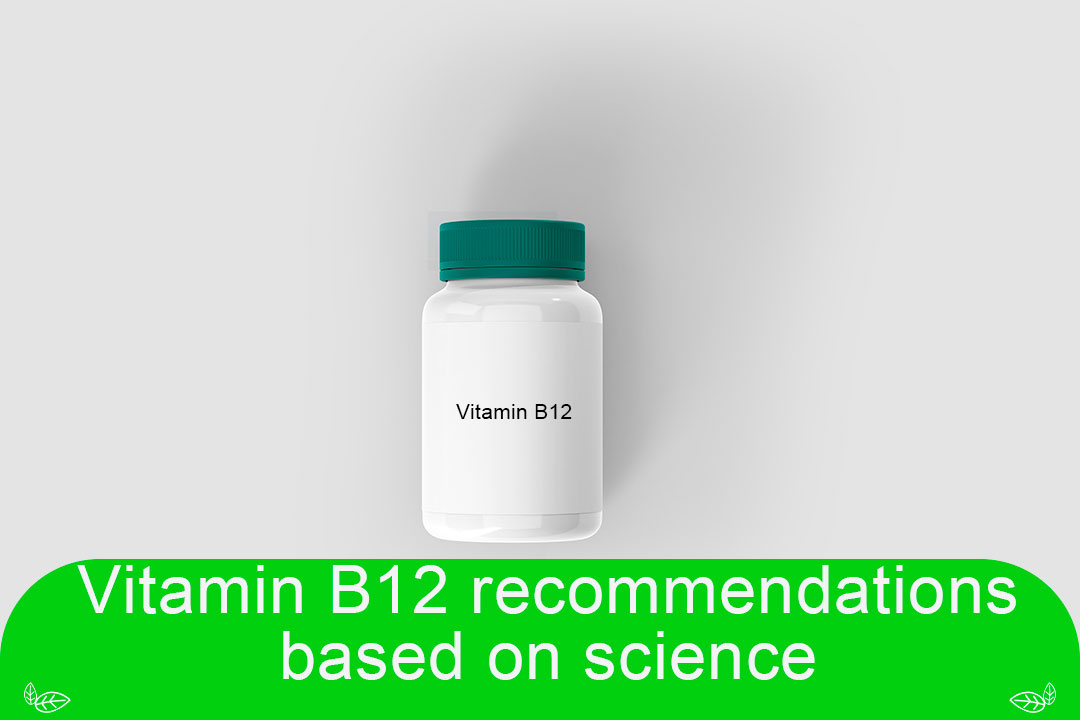Did you know that vitamin B12 deficiency can lead to some serious problems such as blindness [1], anemia [2] and others? As you can see taking vitamin B12 is really important for our health.
Also, taking vitamin B12 is required not only for vegans but for some other groups of people too.
So, in this post we’ll find out what vitamin B12 is, vitamin B12 defieciency symptoms, how to treat vitamin B12 deficiency, what is the recommended daily dose of vitamin B12 and who should take vitamin B12.
What is vitamin B12?
Vitamin B12 is a nutrient that is naturally present in some foods, added to others, and available as a dietary supplement. It plays a critical role in many important bodily functions, including:
- normal functioning of the brain and nervous system
- formation of red blood cells
- helping create our DNA.
Vitamin B12 deficiency symptoms
Vitamin B12 deficiency can lead to some serious symptoms and in some cases even irreversible damage to the brain, nervous system and overall health.
Vitamin B12 deficiency symptoms may include:
- depression
- fatigue
- mood changes
- paresthesia (tingling and numbness) in hands and feet
- erectile dysfunction
- menstrual problems
- weight loss
- dementia
- diarrhea
There are a few tests to check for vitamin B12 deficiency:
- overall vitamin B12
- methylmalonic acid (MMA)
- homocysteine
- holotranscobalamin (holoTC)
There are cases with people having test results within a normal range while having B12 symptoms of deficiency such as numbness, paresthesia in hands and feet, mood changes, fatigue, weakness, nausea, pain in joints, dyspnea on exertion, muscle cramps, erectile dysfunction and others. After treatment with vitamin B12 most of these patients’ symptoms disappeared. Some symptoms remained probably because of not fully-reversible damage caused by vitamin B12 deficiency. [3]
So, keep in mind that tests for B12 deficiency sometimes can be incorrect.
There are cases where people who eat eggs and other products containing vitamin B12 still have vitamin B12 deficiency. For example, there’s a case of a vegetarian mother with B12 deficiency. [2]
A systematic review of randomized controlled trials says that high oral doses of vitamin B12 could be as effective as intramuscular administration in treating vitamin B12 deficiency. [4]
What are the best sources of vitamin B12?
Vitamin B12 can be found in animal foods, fortified foods or supplements. Plant foods do not contain vitamin B12 unless they are fortified.
Main food sources of vitamin B12 are animal foods including clams, beef liver, fish, meat, poultry, eggs, milk, and other dairy products.
Also, there are some breakfast cereals, nutritional yeasts, and other products fortified with vitamin B12.
Vitamin B12 supplements can be in different forms including cyanocobalamin, methylcobalamin, and hydroxocobalamin. [5]
What form of vitamin B12 supplements is better?
There are different forms of vitamin B12 supplements including adenosylcobalamin, cyanocobalamin, methylcobalamin, and hydroxocobalamin. Some popular forms are cyanocobalamin and methylcobalamin.
There’s no evidence suggesting that some forms of vitamin B12 supplements have better absorption than others. [5]
What’s the best way to get vitamin В12: intramuscular or sublingual (oral)?
There were no apparent substantial differences between the absorption of sublingual and intramuscular forms of B12 [6, 7]. However, oral dissolution and mixing with saliva could be critical for absorbing vitamin B12. [6]
Who should take vitamin B12 supplements?
Vitamin B12 supplements are recommended for older adults over 50 years old, those who are pregnant or nursing, people with pernicious anemia, stomach problems or disorders (e.g. Crohn’s disease) or who have had some types of stomach or intestinal surgery, people who eat little or no animal foods such as vegans and vegetarians. [5, 8]
Vitamin B12 recommended daily intake
Recommended daily intake of vitamin B12 for people over 14 years old is 2.4 mcg/day.
However, considering the fact that our body can absorb only a limited amount of vitamin B12 per 1 serving [10, 11], some scientific research says that the recommended daily dose of vitamin B12 for maintaining already normal B12 levels in pregnant and lactating women, children older than 11 years is 50 mcg / day or 2×2000 mcg / week. [9]
For vitamin B12 deficiency in pregnant and lactating women the recommended daily dose of vitamin B12 is 1000 mcg / day for 1-4 months based on the level of B12 deficiency. [9]
If you have vitamin B12 deficiency then I would recommend taking 1000 mcg / day or more of cyanocobalamin/methylcobalamin for 1-4 month based on your B12 deficiency level.
If you’re over 50 years old then it’s also recommended to take 1000 mcg / day or more of cyanocobalamin/methylcobalamin.
It’s difficult to overdose on vitamin B12 so don’t worry about taking too much.
Summary
So, should you take vitamin B12 supplements, what is the best way to get vitamin B12 and what is the recommended daily dose of vitamin b12 based on science?
Well, you should take vitamin B12 supplements if you’re over 50 years old, pregnant, nursing, have pernicious anemia, stomach problems or have had some type of stomach surgery or if you eat little or no animal products (e.g. you’re a vegan or a vegetarian).
The best way to get vitamin В12 is either intramuscular or sublingual (oral). Scientific research showed that there were no apparent substantial differences between the absorption of sublingual and intramuscular forms of B12. However, it’s important to mix B12 with saliva for the proper absorption of vitamin B12 using sublingual (oral) form.
The recommended daily dose of vitamin B12 for maintaining already normal B12 levels in pregnant and lactating women, children older than 11 years is 50 mcg / day or 2×2000 mcg / week.
For vitamin B12 deficiency in pregnant and lactating women the recommended daily dose of vitamin B12 is 1000 mcg / day for 1-4 months based on the level of B12 deficiency.
If you have vitamin B12 deficiency then I would recommend taking 1000 mcg / day or more of cyanocobalamin/methylcobalamin for 1-4 months based on your B12 deficiency level.
If you’re over 50 years old then it’s also recommended to take 1000 mcg / day or more of cyanocobalamin/methylcobalamin.
Personally, I like taking about 200 mcg / day of cyanocobalamin for a few months, then I switch to 1000 mcg / day of methylcobalamin for a few months, then again 200 mcg / day of cyanocobalamin and so on.
P.S. If you want to learn more about other vitamins, what are their recommended dosages based on science, get healthy meal plan examples, my top science-based recipes that can be cooked in less than 30 minutes each and find out how science-based nutrition can prevent and treat the most common diseases, improve your overall health and help you live longer then you can click here to learn more.
If you don’t want to miss my other articles then click here to subscribe to my Telegram Channel or use the form below to subscribe to my email newsletter.
You can read some of my other latest articles as well:
- Is having 6 pack abs healthy based on science?
- Does listening to music help with stress based on science?
- Why go vegan and 5 easy steps how to go vegan for beginners
- Is soy healthy based on science or does soy cause cancer?
- 5 healthy vegan salad recipes (oil-free)
- Animal vs plant protein. Which protein is best for health and strength based on science?
- 4 easy vegan pie recipes (+1 bonus recipe)
- Vitamin B12 recommendations based on science
- What is a superset and should you do supersets based on science?
- Top 10 vegan burger recipes
- Can music improve athletic performance based on science?
- How many sets should I do to build muscle based on science?
- Science-based iodine recommendations
- Should you train to failure based on science?
- How much protein can your body absorb in one meal based on science?
- Top 10 motivational quotes
- Omega-3 fatty acids recommendations
- What is the best training frequency for building muscle based on science?
- Best plant-based protein foods
- Happy New Year 2023!
- Does meditation help with stress and aging based on science?
- Is salt healthy based on science?
- Foods to improve performance in sports
- Healthy foods that last for a long time without a fridge
- Science-based macronutrient recommendations for athletes
- Top 7 healthy nuts to eat based on science
- Vitamin D recommendations, dosage, its impact on health
- How to live longer by increasing telomere length
- Healthy beverages based on science
- Recipe: whole wheat no-yeast vegan pizza dough
- What is NEAT? How to lose weight with NEAT?
- Are calcium supplements safe based on science?
- Are nuts good for weight loss and health
- 4 simple steps how I gained 1.5 kg (3+ lbs) per week healthily and how you can too
- Top 5 foods to avoid for weight loss and health
- Is fasting safe for weight loss and health?
- Top 10 healthiest berries
- Does healthy mindset really help improve our results (science-based)?
- Are potatoes healthy for you based on science?
- Is HIIT better than cardio based on science?
- What’s the best free nutrition tracker?
- How to build good habits in 4 simple science-based steps
- What are the scientific benefits of exercise?
- Are eggs actually good for you based on science?
- How to lose weight in 4 easy steps (science-based)
- Is keto diet safe and effective way to lose weight?
- Cardiovascular disease risk factors and treatment
- Is coffee healthy or does it increase the risk of diseases?
- Is laughter the best medicine?
- Can diet prevent and treat diabetes?

